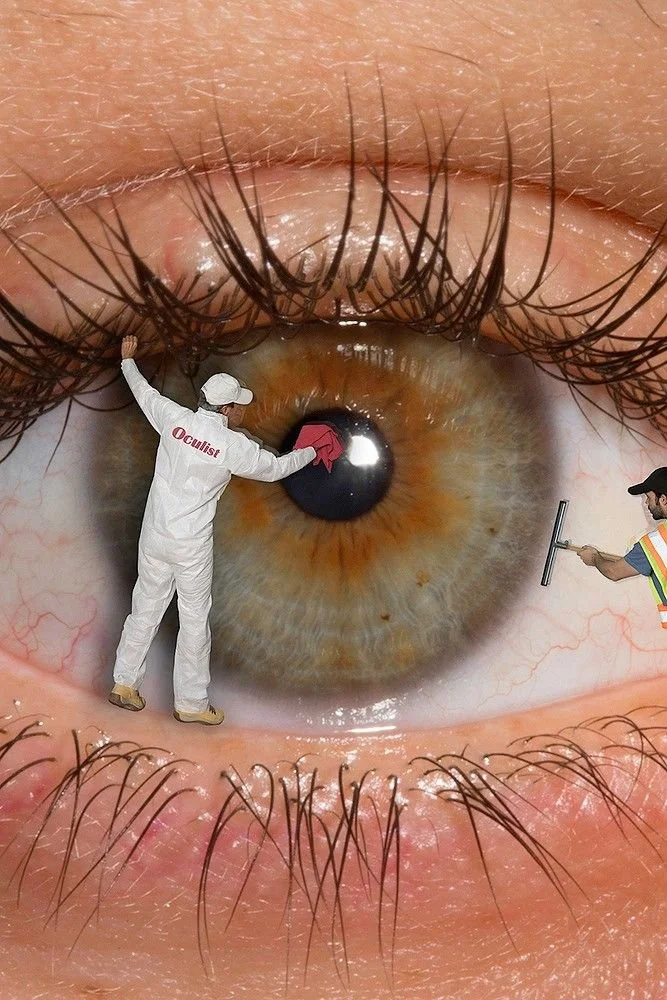Eye Spy. The Secrets Hiding in the Whites of Your Eyes
Our eyes are often called the windows to the soul, but did you know the whites of your eyes (the sclera) can also be little messengers about your overall health? From a brilliant white to tones of yellow, red, or even blue-grey, the colour and condition of your sclera can offer clues that might prompt a little more attention.
Bright and Clear Whites: The Ideal
Bright, clear whites are generally a sign of good health and good hydration. They indicate that your eyes are well-maintained and your body is likely free of major underlying issues. If your sclera looks clean and bright, it’s a happy sign that you’re likely nourishing yourself well, getting sufficient restful sleep, and managing stress effectively.
Blue or Blue-Grey: Thin Sclera or Collagen Issues
If your sclera appears slightly blue or blue-grey, this can sometimes mean the sclera is thinner than usual, which allows the underlying tissues to peek through. This thinner sclera can be a sign of ageing or hereditary conditions. In rare cases, it can be linked to connective tissue disorders or issues with collagen production. While often not urgent, if you notice this change suddenly or alongside other symptoms, it’s worth discussing with a doctor.
Yellow: A Warning Sign for Liver Health
Yellowing of the whites of the eyes is often the most well-known and significant colour change. This yellow tint, medically called jaundice, means that bilirubin—a substance produced during the normal breakdown of red blood cells—is building up in your body. It usually points to liver problems such as hepatitis, gallstones, or liver diseases. If you or someone you know notices yellow sclera, it’s important to seek medical advice promptly.
White Ring Around the Eye
A white ring around the eye, known medically as arcus senilis, can sometimes be associated with high cholesterol levels. This ring is a deposit of cholesterol and fat that appears in the cornea. While arcus senilis is common and often considered a normal part of ageing, especially in people over 50, its presence in younger individuals could indicate elevated cholesterol or lipid abnormalities. If you notice this ring around your eyes, it’s advisable to consult a healthcare professional for a full lipid profile and cardiovascular risk assessment.
Red: Irritation, Allergies, or Infection
Redness in the eyes is a common signal that your eyes are irritated. It could be caused by dryness, lack of sleep, allergies, or even minor infections like conjunctivitis (pink eye). Sometimes, red eyes occur after exposure to smoke, dust, or excessive screen time. Usually, this clears up with rest and hydration, but persistent redness or pain should be checked by a professional.
Brown or Dark Spots: Ageing and Sun Exposure
Dark spots or patches on the sclera are often caused by ageing or sun exposure, similar to freckles on the skin. These are generally harmless but should be monitored for any changes in size or colour. If something looks new or unusual, it’s always best to get it evaluated.
Everyday Wellness for Bright Eyes
While colour changes linked to liver or other health issues need medical care, these simple steps can help your eyes look and feel fresher:
Hydrate: Water keeps your eyes comfortable and prevents dryness.
Eat eye-friendly foods: Vitamin A (carrots, leafy greens, sweet potatoes) and omega-3s (salmon, flaxseeds, walnuts) all support eye health.
Manage stress through mindfulness, breathing exercises, or other relaxation techniques.
Screen breaks: Try the 20-20-20 rule — every 20 minutes, look 20 feet away for 20 seconds.
Sleep well: Rest is the ultimate natural brightener for your eyes.
The Takeaway
Your eyes really are windows to your health. If they look bright and clear, it’s usually a sign you’re looking after yourself. But sudden changes — especially yellowing or painful redness — are worth checking with a professional.
So, keep sipping water, eat your greens, rest those eyes from screens… and let your eyes shine as a reflection of your wellness inside and out.
Love from Fallon, with intention xox
Disclaimer
The content provided in our articles is provided for information purposes only and is not a substitute for professional advice and consultation, including professional medical advice and consultation; it is provided with the understanding that Fallon is not engaged in the provision or rendering of medical advice or services. The opinions and content included in the articles are the views only and may not be scientifically factual. You understand and agree by reading anything on our website that Fallon shall not be liable for any claim, loss, or damage arising out of the use of, or reliance upon any content or information published. You acknowledge and agree that Fallon, its authors, and contributors are not liable for any adverse reactions or consequences resulting from the use or misuse of the information provided. Always exercise caution and prioritise your health and safety. Images are from Pinterest, if you know the original creator please let us know, so that we can credit them.


